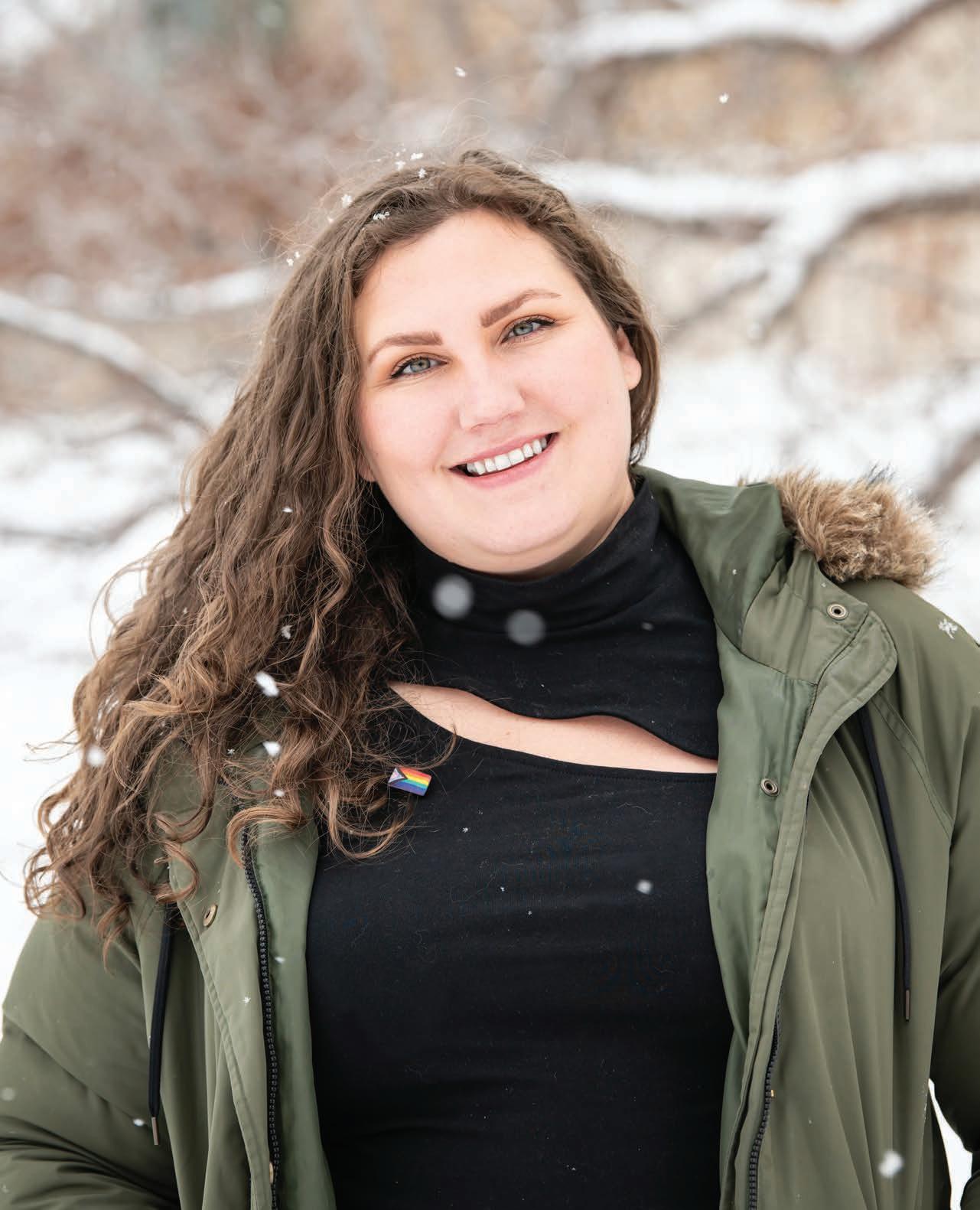
QUEERING INDIGENOUS INCLUSION
NAT GEO EDVENTURE OF A LIFETIME MINISTER OF ED NELLO ALTOMARE TAKES THE HELM BREAKING THE STRESS CYCLE
WINTER 2024 | VOLUME 102 NUMBER 2
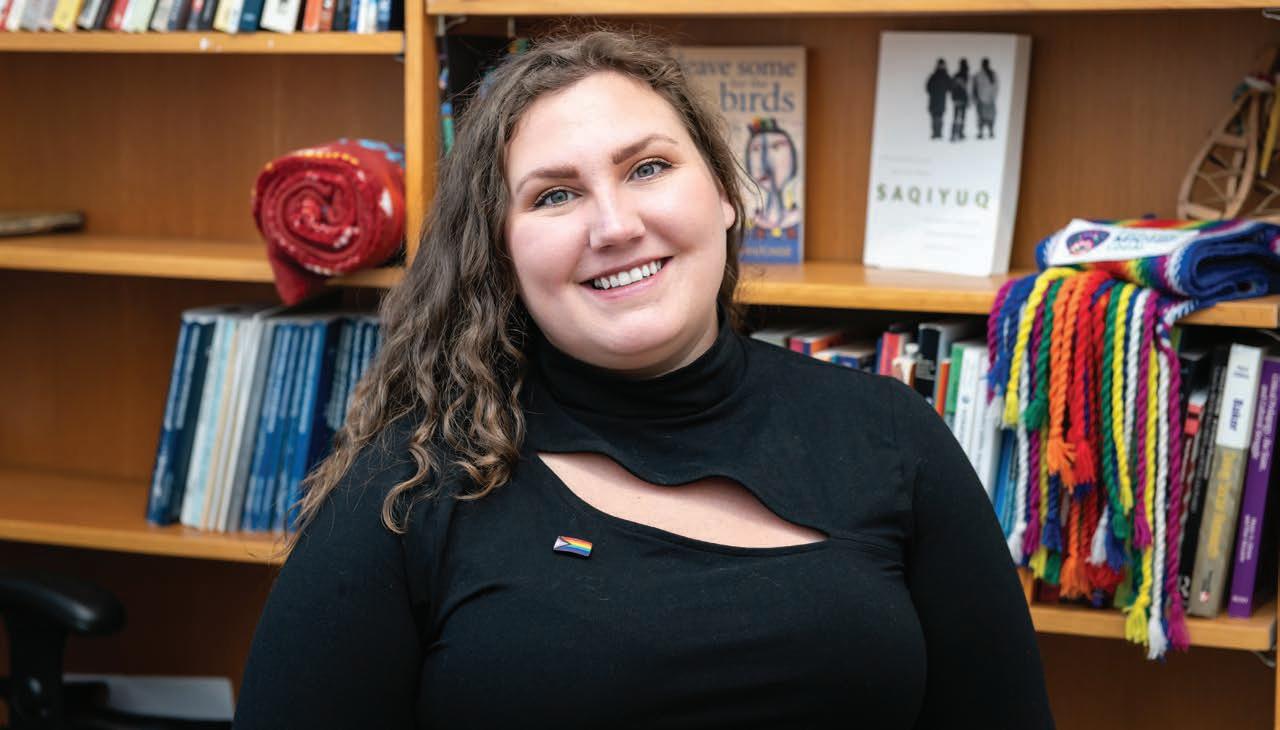
There’s plenty of good, easily accessible Indigenous content available to teachers today, but whose perspectives and experiences do they reflect? Creating a safer environment for queer Indigenous students and a fuller picture of Indigenous history and culture means asking who isn’t being heard—and why not.
CONTENTS WINTER 2024 | VOLUME 102 NUMBER 2
14 COVER STORY QUEERING INDIGENOUS INCLUSION: HOLDING SPACE AND THINKING CRITICALLY FROM THE PRESIDENT 5 FROM THE EXECUTIVE DIRECTOR 7 SUSPENSION POLICY RESEARCH UNTAPPED POTENTIAL 12 18 WE ASKED TEACHERS MTS PD DAY RECAP TENDING OUR ROOTS, TELLING OUR STORIES BARGAINING UPDATE 21 26 24 32 14 BOOK REVIEWS PG.34

8
AN EDVENTURE OF A LIFETIME: SOJOURN ON THE SEA LEADS TO LEARNING ON THE LAND
Jenna Forslund grew up with the National Geographic magazine, but never dreamed she would one day set sail on a Nat Geo expedition to Japan with researchers examining coral reefs. The experience was a career highlight for the Winnipeg high school teacher, who connected that learning with her math and science students back home.
22
EDUCATION MINISTER NELLO ALTOMARE: FORMER TEACHER TAKES THE HELM
Manitoba’s new Minister of Education and Early Childhood Learning, Nello Altomare, is one of seven members of the NDP caucus who taught in public schools. The former River East Transcona Teachers’ Association member reflects on poverty’s impact on classrooms, staffing challenges, nutrition programs, collaboration with education partners and safer places for 2SLGBTQIA+ students.
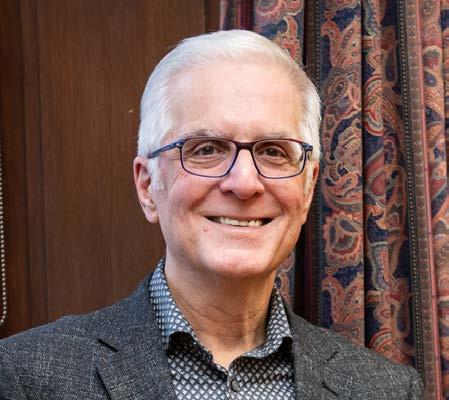
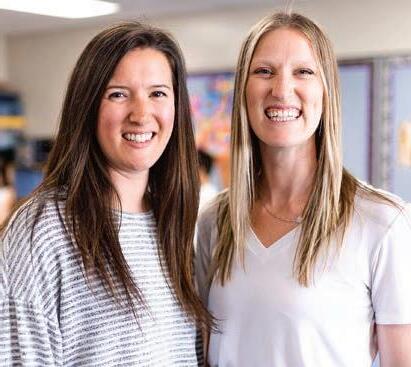
28
BREAKING THE STRESS CYCLE: A SIMPLE CLASSROOM ROUTINE FOR WELL-BEING
You’ve come out of a difficult meeting. There are lesson plans to review, a report to write, your child is sick, you slept terribly last night, and those report cards aren’t writing themselves. Emotions are classroom contagions, and a few easy to implement stress busting strategies can help you and your students relax and focus.
8 22 28
EDITOR
Anne Bennett abennett@mbteach.org
ART DIRECTION AND DESIGN
Krista Rutledge krutledge@mbteach.org
PHOTOGRAPHY
Matea Tuhtar mtuhtar@mbteach.org
CIRCULATION
Jennifer Nasse jnasse@mbteach.org
ADVERTISING
Matea Tuhtar advertising@mbteach.org
SUBSCRIPTIONS
The MB Teacher is published three times a year by The Manitoba Teachers’ Society. Articles and views published herein do not necessarily represent the policies nor the views of the Society.
©2024 by The Manitoba Teachers’ Society. Unauthorized use or duplication without prior approval is strictly prohibited.
THE MANITOBA TEACHERS’ SOCIETY
191 Harcourt Street Winnipeg, Manitoba R3J 3H2
Phone: 204-888-7961 Fax : 204-831-0877
/manitobateachers
/mbteachers
www.mbteach.org
CONTRIBUTORS
WINTER 2024
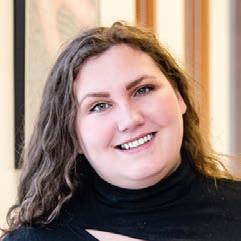

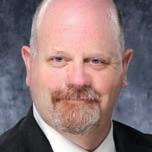


PUBLICATIONS MAIL AGREEMENT
40063378 ISSN 002-228X
Return undeliverable Canadian addresses to Contact Services at The Manitoba Teachers’ Society.

Lucy Fowler
PAGE 14
Lucy Fowler, PhD, is a Two-Spirit Métis woman, born and raised in Winnipeg, Manitoba. She taught as both a homeroom and substitute teacher. Now an assistant professor in the Faculty of Education at the University of Manitoba, Lucy has a research and teaching focus on Métis youth identity, Indigenous education, queer theory, hip-hop pedagogies, and youth cultures.
Lesley Eblie Trudel
Wayne Davies
PAGE 12
Dr. Lesley Eblie Trudel and Wayne Davies have worked in the public education system for decades, with particular interest in diverse and inclusive communities and the impact of culture on Indigenous graduation rates, respectively. Lesley is currently the Associate Dean in the Faculty of Education at the University of Winnipeg. Wayne was principal of Robert Smith Elementary and École Selkirk Junior High and is taking his Ed.d at the University of Western Ontario focusing on Educational Leadership.
Kailey Lefko
Josianne Barnabé
PAGE 28
Kailey Lefko and Josianne Barnabé are educators, speakers, co-founders of Educalme and co-hosts of The Balanced Educator podcast. Kailey has taught in high school and middle school French Immersion settings in Beausejour and Winnipeg, while Josianne has a background in special education, working with students with developmental disabilities and autism. They’re passionate about creating opportunities for interdisciplinary, inclusive, and engaging socialemotional learning.
Bonnie Rempel
PAGE 32
Bonnie Rempel is the principal of R.D. Parker Collegiate in Thompson, Manitoba. An educator for thirty-one years, Bonnie has spent her entire career in Thompson. She will soon conclude her career as the principal at R.D. Parker, where she graduated in 1987. Bonnie is looking forward to retirement in La Salle, Manitoba.
MTS IS HERE FOR YOU
Nathan Martindale
Early discussions with Minister Altomare have been encouraging and we look forward to ongoing dialogue.

Following last fall’s provincial election, Education and Early Childhood Learning Minister Nello Altomare was issued a mandate letter from Premier Wab Kinew. After years of neglect of public education, that mandate letter provided considerable reason for optimism. The priorities identified by the government reflected many of those championed by MTS, not just during the election campaign, but for years prior.
Early discussions with Minister Altomare have been encouraging and we look forward to regular, ongoing dialogue with him on a wide range of issues. These include the previous government’s inability to adequately fund public education, the making of necessary amendments to Bill 35 – The Education Administration Amendment Act, and ensuring the safety of all students and classrooms, with particular emphasis on youth vulnerable to the rise in hateful rhetoric and attacks on inclusive education across the province.
UPDATE ON BILL 35
The Society expects considerable development over the coming year relative to Bill 35 – The Education Administration Amendment Act. The previous government introduced the legislation on March 13, 2023, and MTS and its members were vocal in raising concerns with several aspects of the bill.
Based on that feedback the former government made the following amendments before passing the bill, including:
• The expressed right to representation is now included in the bill.
• The commitment to consult with the sector prior to establishing the professional standards is now included in the bill.
• The bill will now require that personal health information not be made public when a teacher is found to be incapable of carrying out the responsibilities of the profession due to a mental or physical disability, unless the commissioner is satisfied that the
public interest in making the information public significantly outweighs the teacher’s privacy interests.
While the bill received royal assent on May 30, 2023, due to its complexity it will come into force in stages through selective proclamation and introduction of new or amended regulations.
The Society is prepared to work with the government in drafting the professional standards and in all other capacities to help shape the legislation to ensure the protection of both students and teachers. Discussions with the government are ongoing and we will keep you updated as developments occur. You’ll find additional background on the bill at mbteach.org.
WORKING WITH OUR PARTNERS
Over the past year education stakeholders including MTS, the Manitoba School Boards Association, the Manitoba Association of School Superintendents (MASS), the Manitoba Association of Parent Councils (MAPC) and the MSBA have leveraged their collective commitment to public education, speaking out, publicly and behind the scenes on issues of common interest. This partnership has been exceptionally positive, amplifying each other’s resolve to improve the quality of public education in Manitoba. We have worked together already with respect to education funding and anti-hate initiatives and look forward to continuing that work.
Please don’t hesitate to connect with your Local association and the Society by phone, email or social media. We’re here for you, and we need to hear your voice. View the mandate letter at https://www.gov. mb.ca/asset_library/en/proactive/20232024/ education-and-early-childhood-mandateletter.pdf or scan the QR code.
WINTER 2024 | THE MB TEACHER 5
FROM THE PRESIDENT
Keep updated with the SUB
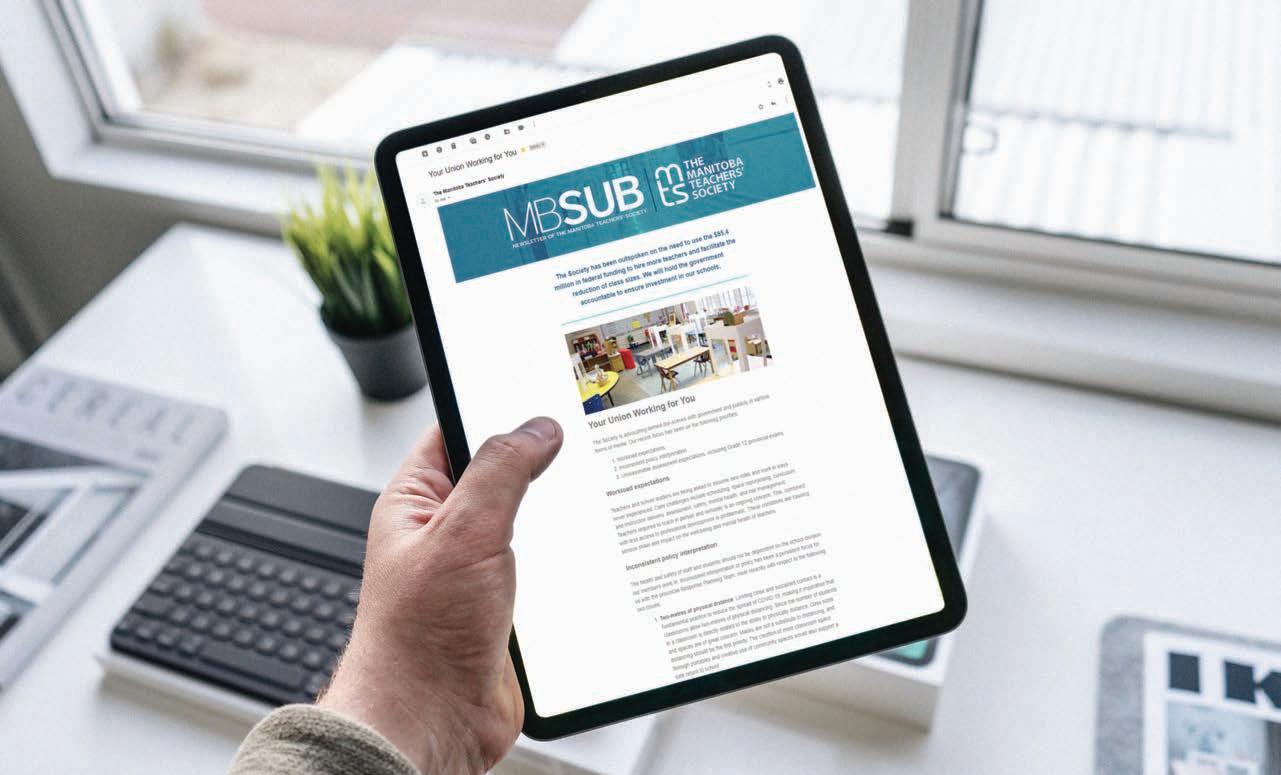
The Manitoba Sub is our e-newsletter with breaking news, upcoming events and much more delivered right to your inbox.
Didn’t get the email? Call Contact Services to update your email address. Still didn’t get the email? Check your spam folder! This is an email worth reading. Contact
Services can be reached at: 1-800-262-8803
MIND THE GAP
Roland Stankevicius
Winter issue explores what we’re missing, not just what we know.
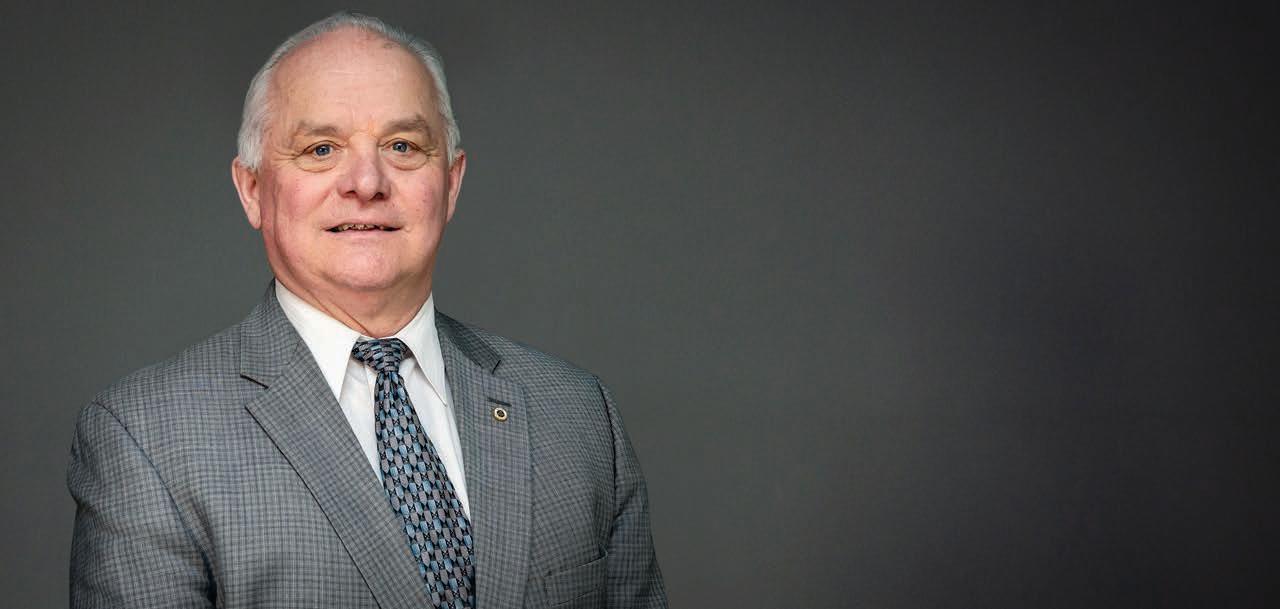
You might wonder from time to time how we determine the content provided in the MB Teacher magazine. The answer, quite simply, is we draw from the experiences and challenges of our members and reflect that reality back in ways intended to clarify, inform, and inspire at a time when clarity, (accurate) information and inspiration can be hard to come by.
IN THIS ISSUE
In this winter issue we hope you’ll find all this and more, starting with our cover story, Queering Indigenous Inclusion (page 14). It’s never been more important than it is right now to continually ask ourselves, “what are we missing” when we impart information, particularly when it’s intended to reflect the fullest representation possible of Indigenous voices and history. Lucy Fowler offers an important addition to that conversation and the resources teachers draw on for their classrooms.
At MTS Provincial Council 2023 a Resolution was passed calling on the Society to lobby the government to increase funding for adult learning and literacy, and to advocate for consistent oversight within the Department of Education. Conversations with the government on this matter are ongoing, and the current government has already displayed an understanding of the vital role played by adult basic education, introducing Bill 6 – The Adult Literacy Act , which aims to provide effective literacy programming for adults in collaboration with non-governmental organizations. There’s no doubt that a robust adult basic education system and
literacy programming are much needed in Manitoba, and that the benefits of such initiatives reach widely and deeply. Our interview with Jim Silver from the Canadian Centre for Policy Alternatives (page 18), sheds light on how incredibly important adult education and literacy are, not only to adults, but to their children, and the importance of the Society’s voice in advocating for those programs and services.
There’s new research on suspension policy development, and you’ll find a summary of that work in Exploring the Dangerous Space Between Good Intentions and Meaningful Interventions (page 12). Lesley Trudel and Wayne Davies of the University of Winnipeg offer their findings and explore questions like the role privilege might play in determining who is suspended, and who is not.
MTS member Jenna Forslund takes us on an expedition to Japan in “An Edventure of a Lifetime” (page 8), sharing how she became involved with the National Geographic Society. Jenna explains what the trip meant to her as an educator and how she’s transferring that learning into her classroom.
MTS continues to work on your behalf at the Provincial Bargaining Table, and you’ll find an update on page 21, with more details available by logging into your MyProfile Account at mbteach.org
You’ll note that I’m serving in an interim capacity for MTS Executive Director Danielle Fullan Kolton. We wish her a full recovery and look forward to seeing her again soon.
WINTER 2024 | THE MB TEACHER 7
FROM THE INTERIM EXECUTIVE DIRECTOR
AN EDVENTURE OF A LIFETIME: NATIONAL GEOGRAPHIC EDUCATION INITIATIVES
By Matea Tuhtar, MTS Staff
The Grosvenor Teacher Fellowship is a professional development opportunity for K-12 educators made possible by a partnership between Lindblad Expeditions and the National Geographic Society. Teachers are hosted onboard various Lindblad Expeditions voyages across the world, as well as making a two-year ambassador commitment to support National Geographic education initiatives.
Like many of us, teacher Jenna Forslund grew up reading the National Geographic magazine, full of intriguing stories about people, places, and discoveries of our world. She never would have believed that one day she would find herself on a life-changing National Geographic voyage, one that she recalls as “the experience of a lifetime.”
Forslund, who teaches in the Winnipeg School Division, was one of 50 exemplary educators from across the United States and Canada, accepted to the Grosvenor Teacher Fellowship. The Fellowship is a professional development opportunity for K-12 educators made possible by a partnership between Lindblad Expeditions and the National Geographic Society. The teachers are hosted onboard
various Lindblad Expeditions voyages across the world, as well as making a two-year ambassador commitment to support National Geographic education initiatives.
“To be honest, I’m still kind of processing the whole experience,” says Forslund. “I work within an amazing community of educators, not just in the province, but globally. So this idea that my application stuck out amongst others is just such an honour. I’m so glad that I get to represent my school and my division, and my province and country.”
Forslund became involved with the National Geographic Society during the pandemic by registering for their certified education program and taking online classes. She completed a capstone

project where she did an activity with Minecraft to get her students to connect to their community. “I try really hard to connect students to their community and to provide them opportunities to think globally,” says Forslund. “I was really able to highlight that experience and a lot of other experiences that I’ve done to strengthen my application to the Fellowship.”
ONE OF A KIND PD OPPORTUNITY
Forslund received her acceptance call last February and got to list her top choices of expedition locations. She and another teacher were selected to travel to Japan for a two-week expedition in September. Some of the other
8 THE MB TEACHER | WINTER 2024
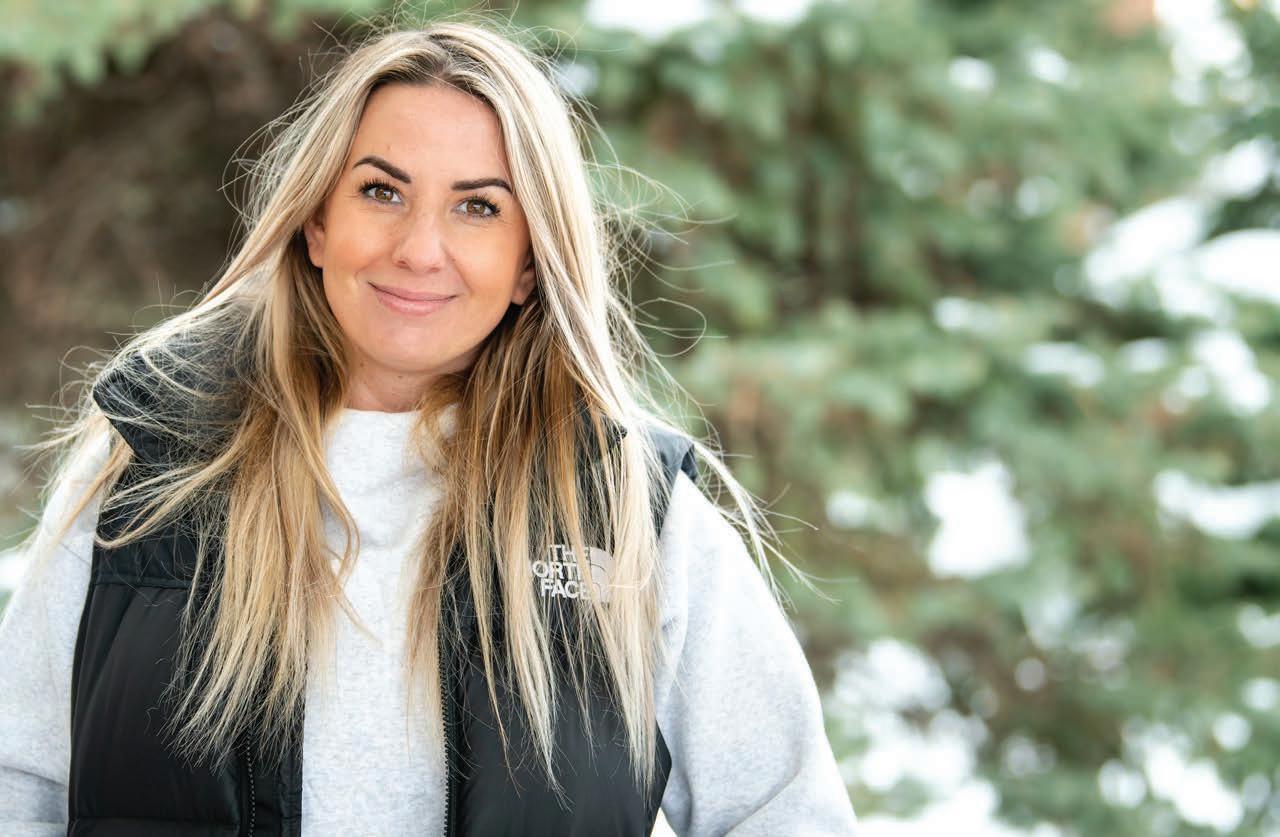
available expedition locations were the Galapagos Islands, Indonesia, Svalbard, and Antarctica.
“The expeditions are such an awesome opportunity to get teachers out of their classrooms and see some of these places around the world through an expeditionary lens, and then bring real world experiences back,” says Forslund. The ship that Forslund sailed on had a National Geographic scientist on board who was conducting research on coral reefs. “Being able to talk to them and see what they were doing in their field was amazing.”
Forslund admits she was a little nervous at first when she found out she was going to Japan because the itinerary highlighted a lot of cultural learning.
“And I’m a math and science teacher, so I was like how am I going to turn this into an opportunity in my math and science classroom?” Once in Japan she says she quickly realized that in Japanese culture there’s a high reverence for nature and connecting to the land. “There is a lot of respect there, and a lot of similarities that I noticed with our Indigenous culture here in Canada. It was such a refreshing experience to notice those similarities, as opposed to what we often do is noticing the differences. And so I’m going to use that to connect students to the land and to kind of bridge the two cultures in terms of their understanding towards nature. It’s all still percolating in my head, but I can see now where I can make those connections.”
FIELD BASED EXPERIENCE
Before setting out on her expedition, Forslund and the other educators met in Washington D.C. at the National Geographic headquarters for training and orientation. “It was a surreal moment - because as a little girl I would read the National Geographic magazine and it was one of the things that inspired me to get interested in wildlife and either being a scientist or science teacher. So to see where it was all put together and the history behind it - it was a full circle moment.”
Washington was also the place Forslund first met her expedition partner, Katie Lodes, who is a high school teacher from St. Louis, Missouri. The two connected instantly. “She’s
WINTER 2024 | THE MB TEACHER 9
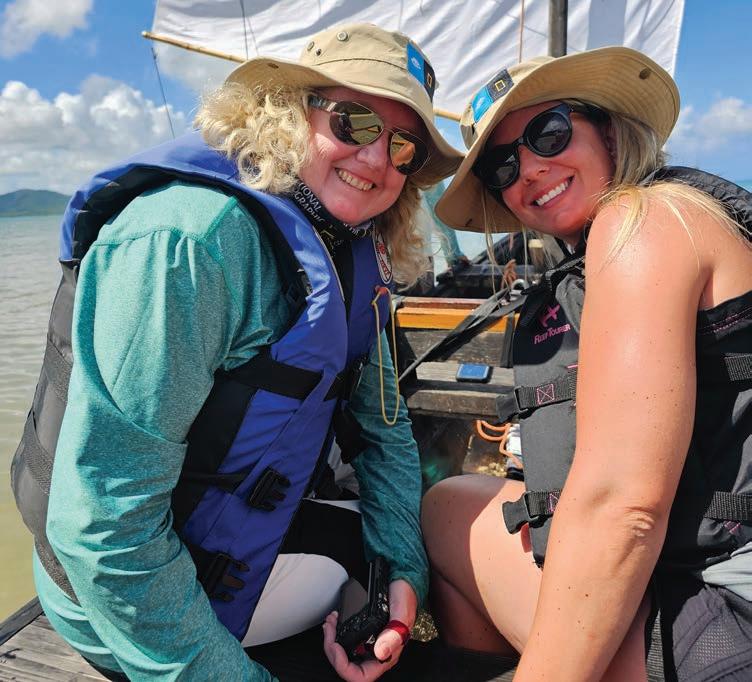
a biology teacher and a science nerd like me. I think we will have a lifelong friendship after this experience.”
Once they flew into Japan, they boarded the expedition ship and travelled through the East China Sea, visiting different islands, and ending the trip in Taiwan. The teachers would get guided tours on the islands and visit various scientific research stations and explore the area. “One of my favorite places was Yakushima,’ says Forslund, “Visiting the old cedar forests there was amazing.” She also got a chance to speak to scientists from Osaka who were doing work with eDNA (Environmental DNA) - something that Forslund’s students were also working with. “It was very interesting to hear some of the similarities and differences.”
BUILDING CONNECTIONS & COLLABORATION
In the evenings, Forslund and Lodes would have time to reflect on the day. “It was nice to have somebody to talk
to and talk about what we learned, and how we can use it in our classroomswe were bouncing ideas back and forth.” They also got a chance to meet other travelers from around the world and hear their stories and experiences.
“I’ve just recently had the time to really reflect on the trip - there was so much we experienced. I’m so thankful for it,” says Forslund, who is now focusing on leveraging her professional development to bring new learning opportunities to her students, and to get them connected to nature. Part of the fellowship role is completing an action project with her students that she will then report on.
Forslund plans on continuing to work with National Geographic in the future. “I’m partnered with them now on another program called Wildlife Explorers, and my students just did a workshop where they were talking to scientists from Kenya over Zoom. The Society offers so many opportunities to support educators and support the stuff

we do in the classroom. And it’s open to Canadians which is great because a lot of organizations aren’t.”
“I strongly encourage other teachers to look into what National Geographic has to offer. There are a lot of amazing resources and I don’t think enough teachers know about them. I encourage other educators to apply for the Fellowship and, if anything, use the application as kind of a reflective tool. Teachers can be stretched this way and that, and we don’t often realize that we’re doing great things in our schools and within our province. This might be an opportunity to showcase that.”
To learn more about the Grosvenor Teacher Fellowship visit https://www. nationalgeographic. org/society/educationresources/professionaldevelopment/grosvenorteacher-fellows/ or scan the QR code.
10 THE MB TEACHER | WINTER 2024
Teachers, get FIT!
Improve your French and your teaching skills during this three-week intensive program!
Améliorez votre français et vos compétences pédagogiques grâce à ce programme intensif de trois semaines!
Summer 2024 – July 8 to 26, 2024
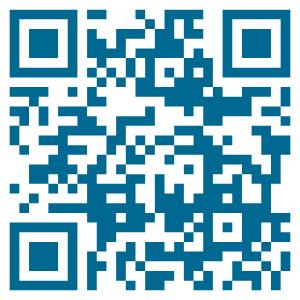
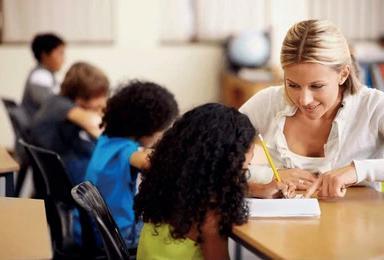
Canadian

ARE YOU A RETIRED OR PART-TIME TEACHER?
U OF M IS CURRENTLY HIRING PRACTICUM ADVISORS TO SUPPORT AND MENTOR TEACHER CANDIDATES.
MAKE A DIFFERENCE...JOIN OUR TEAM!
Deadline is May 17, 2024
For more information visit
https://umanitoba.ca/education/communitypartners/practicum-advisors-mentor-teachers
Questions?
Contact Emily Falk
Practicum and Partnerships Office
Phone: (204)474-8865
Email: practicum.education@umanitoba.ca


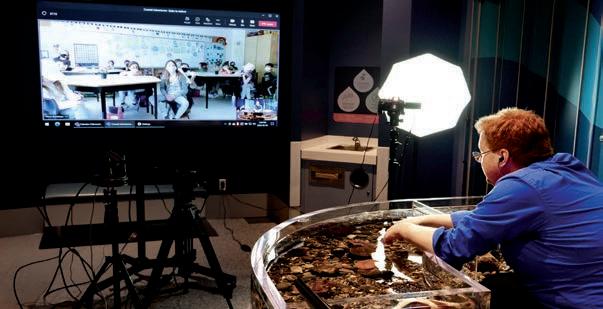
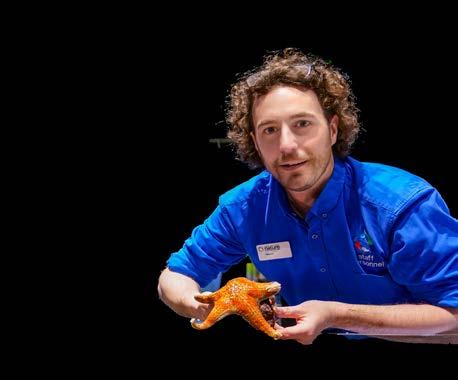

WINTER 2024 | THE MB TEACHER 11 OTTAWA ONTARIO 4 virtual workshops offered! BURSARIES AVAILABLE Curriculum-linked workshops for students of all levels! nature.ca/workshops
NATURALLY
Museum of Nature LEARNING COMES
US TB ONIFACE. CA/E D UC ATI ON PLUS Get more info at ustboniface.ca/en/FIT-english SCAN ME Bursaries available!
SUSPENSION POLICY RESEARCH:
EXPLORING THE DANGEROUS SPACE BETWEEN GOOD INTENTIONS AND MEANINGFUL INTERVENTIONS
By Lesley Eblie Trudel and Wayne Davies, The University of Winnipeg
A 2018 report by the Manitoba Advocate for Children and Youth (MACY)
propelled a recommendation for reassessment of practices regarding out-ofschool suspensions and advocated for the development of a comprehensive, province-wide strategy to limit, reduce or potentially phase out exclusionary practices, except in cases of imminent safety risk to students and staff.
Building on the backdrop of MACY’s report, our independent study on school suspensions was conceived. Moreover, with a lens on the space between meaningful interventions and good intentions, our goal was to give voice to Manitoba school leaders (principals, vice-principals and designates) on current suspension practices across the province. Notably, data for this study was gathered through collaboration with the Council of School Leaders (COSL) of The Manitoba Teachers’ Society. In focus groups, school leaders were asked to provide constructive and critical insights on the authority to suspend, articulate criteria for invoking school suspensions in scenarios where imminent safety risks were perceived, and explore alternative approaches related to school discipline.
KEY CONCEPTS
Key concepts from the literature:
• Employing the concept of collective efficacy (Bandura, 1986), we highlighted the vital role of school leaders in fostering the belief that school teams can positively influence student outcomes.

• Applying the social-ecological framework (Bronfenbrenner & Cici, 1994), we illustrated how school leaders could counteract the concerning trend of the ‘school-to-prison pipeline’ by fostering community engagement, equity, diversity and inclusion in their daily practices.
• Considering the impact of poverty and diversity on the over-representation of
suspended students, we noted the work of Shields (2010) who underscored the role of transformative social justice in preparing school leaders to challenge power dynamics and reconstruct opportunities for equity.
• Being mindful of the research of Weick (1976) who identified that schools operate as 'loosely coupled’ systems, we
12 THE MB TEACHER | WINTER 2024
cautioned that new legislation, policies or guidelines could ‘re-couple’ the education system, effectively reducing the flexibility and discretion currently held by school leaders.
CONSTRUCTIVE ELEMENTS
When asked to identify constructive elements of school suspensions, school leaders were supportive of the continued practice, under specific conditions. They emphasized the importance of first being proactive, providing preventative measures, and involving school student services teams in discussions around the process. School leaders added that school suspensions should be invoked sparingly with a focus on maintaining school safety. Clear communication with parents and families was seen as essential when a suspension occurs, signaling the need for subsequent support and collaboration. School leaders described the re-entry process as integral, involving meetings to co-create safety plans and devise ongoing supports for students with greater needs. They emphasized that suspensions are not a solution but rather part of a broader process that begins with interventions, supports, and teaching. The overall sentiment was that students with challenges need connection, not exclusion, and that suspension should be considered only after exploring possible alternatives.
CRITICAL ASPECTS
School leaders reflected on critical aspects of suspensions, most often referring to previous involvement with zero-tolerance approaches. They underscored the harms caused by reduced opportunities for interpretation and attention to local context, resulting in diminished connections with students and their families. Highlighting the importance of discretion when suspending, school leaders emphasized the social responsibility of maintaining school safety, while at the same time fostering community relations and building rapport with students, staff and families. Some school leaders maintained the importance of flexibility to offer a ‘pause’ for students with additional learning needs and abilities, temporarily removing them from the common learning environment instead of resorting to a negatively perceived suspension. School
leaders added that policies requiring them to formally categorize ‘inclusive adaptations’ as suspensions would be seen as barriers to effective work with students and their families.
DEFINING IMMINENT SAFETY RISK
When asked about their understanding of "imminent safety risk" and whether school suspensions should be limited to such instances, school leaders expressed diverse interpretations. Some broadened the discussion to include concerns about psychological safety, contemplating threats beyond the realm of physical harm. There was speculation that the call to limit the practice of suspension might have come from a public perception of widespread usage, prompting the need for re-assessment of current practices. School leaders again expressed concern about restrictive policy definitions and emphasized the importance of leveraging frontline skills and collaborative decision-making based on the insights of professionals who are familiar with the students.
LEADING WITH ALTERNATIVE APPROACHES
While exploring alternative approaches to managing student behavior, school leaders commented on the relevance of student specific planning processes, and emphasized strategies such as restitution and restorative action in strengthening social emotional learning skills. Additionally, the use of violence threat risk assessments to create student profiles for planning and programming was endorsed. That said, concerns were raised about the lack of intersectoral resources available from collateral social services such as, CFS, Health/Mental Health, and Justice, especially when supporting alternative approaches. Furthermore, school leaders noted the importance of culturally responsive discipline strategies, recognizing the value of awareness and knowledge related to community context. Overall, the emphasis in focus group responses was on building school environments that not only take behaviors seriously but foster the discretion necessary to explore transparent and alternative processes with students and families.
KEY TAKEAWAYS
Key takeaways from the research:
1. Principals and vice-principals in this study demonstrated collective efficacy, believing in and achieving proactive, supportive and collaborative approaches to leadership for student behaviour.
2. School leaders advocated for planning with a social-ecological lens in mind, highlighting the importance of flexibility in discipline policies and practices to avoid impacting the rapport established with students, families and communities.
3. Addressing transformative social justice, school leaders endorsed the use of alternative discipline strategies, recognizing the vital aspect of cultural proficiency when administering discipline, and advocated for varied responses beyond suspensions for students with additional learning needs and abilities.
4. Throughout, leaders expressed a preference for loosely coupled systems, balancing flexibility with agility, and emphasizing discretion in decisionmaking to adapt student discipline as necessary within school communities.
IN SUMMARY
School leaders in this research study supported the authority to suspend for safety purposes and were critical of prescriptive discipline policies that could limit flexibility or erode rapport established with students and families. Although they did not have consensus on the definition of imminent safety risk, school leaders favoured discretion in decision-making. They endorsed alternative discipline strategies, yet highlighted resource limitations that impacted the efficacy of intersectoral partnerships and supports for students, particularly in rural and remote parts of the province.
To review the Safe and Caring Schools: A Policy Directive Enhancing Proactive Supports to Minimize the Use of Suspension report visit https://www. edu.gov.mb.ca/k12/docs/ support/suspension/ docs/suspension.pdf or scan the QR code.
WINTER 2024 | THE MB TEACHER 13

14 THE MB TEACHER | WINTER 2024

QUEERING INDIGENOUS INCLUSION HOLDING SPACE AND THINKING CRITICALLY
By Lucy Fowler, Ph.D., M.Ed., B.Ed., B.A.
Educators across the province have responded to calls to include Indigenous peoples, perspectives, histories, and cultures in the classroom, with innovative practices demonstrated daily in schools. If you’re reading this article, you’re probably part of the positive movement towards an Indigenized curriculum and safer classroom spaces for Indigenous students.
Many school divisions have created positions and, in some cases, whole departments dedicated to supporting teachers who want to include First Nations, Métis, and Inuit content in their teaching practice. The momentum keeps growing, with the work of Manitoba’s Indigenous Inclusion Directorate and the release of the Mamàhtawisiwin: The Wonder We Are Born With framework. But are queer Indigenous perspectives being included?
As you’ve likely noticed, there is a lot of great Indigenous content out there that is easily accessible and available to classroom teachers and administrators. Unfortunately, some of this content tells stories about First Nations, Métis, and Inuit people that erase the existence of queer and trans people. It reinforces heteronormativity through gendered teachings, including teachings that police the bodies of women and 2SLGBTQ+ people.
WINTER 2024 | THE MB TEACHER 15
Some textbooks and classroom books include descriptions of what they call “traditional roles” in Indigenous communities that were supposedly divided only by gender, and with wording that praises and uplifts the roles of men. And some speakers that are used often by school divisions use a homo/trans/ biphobic definition of the word TwoSpirit, claiming that others are only gay or a lesbian because they have some of the “other” gender in them, instead of queerness being understood as a separate and valid sexual identity.
The fact is, Two-Spirit and Indigiqueer people (also referred to with the acronym 2SLGBT+) face barriers that other Indigenous peoples do not. These include homo/trans/biphobia and difficulty accessing community and ceremonial spaces because of how common these kinds of accessible but heteronormative teachings are. TwoSpirit and Indigiqueer people have no way of knowing whether they will be welcomed into spaces or be asked to change or hide parts of themselves in order to participate.
It is important for Two-Spirit and Indigiqueer students, educators, and community members to feel seen and understood in schools, especially in the current climate of residential school denialism and rising anti-2SLGBTQ+ rhetoric. It's also important for nonIndigenous students to be exposed to an expansive understanding of First Nations, Métis, and Inuit identities in the classroom. For some students, a classroom or school might be their first or only exposure to Indigenous peoples! This is an opportunity to broaden their perspectives.
WHAT CAN I DO?
I know you are reaching through your screen to ask: “What can I do as an educator?” The answer is simple—bring in queer Indigenous voices! Here’s a few ideas to consider:
• Guest Speakers : While funds are not always available for guest speakers who are not already employed by the division, bringing different voices into the classroom
IT IS IMPORTANT FOR TWO-SPIRIT AND INDIGIQUEER STUDENTS, EDUCATORS, AND COMMUNITY MEMBERS TO FEEL SEEN AND UNDERSTOOD IN SCHOOLS, ESPECIALLY IN THE CURRENT CLIMATE OF RESIDENTIAL SCHOOL DENIALISM AND RISING ANTI-2SLGBTQ+ RHETORIC.
is a valuable investment. In Winnipeg alone, there are several queer First Nations, Métis, and Inuit people who design workshops and learning opportunities for a variety of audiences. Apply for funding to support these experts coming to your classroom, or pool resources with others in your school to host a larger event with these speakers.
• Books and Articles : There are any number of talented queer Indigenous authors and scholars currently publishing in Canada. You may want to bring in texts for your students or, if you’re teaching younger ones, you might want to read them to expand your own understandings. Check out the poetic musings of Billy-Ray Belcourt (Driftpile Cree Nation) and Arielle Twist (George Gordon First Nation), the stories of Tanya Tagaq (Inuk) and Joshua Whitehead (Peguis First Nation), or the scholarship of Dr. Alex Wilson (Opaskwayak Cree Nation) and Dr. Chantal Fiola (Red River Métis). These are just a handful of the dozens of brilliant First Nations, Métis, and Inuit minds that are publishing at this moment. See these texts as an immersion
for yourself and a place to learn and reflect on what it is that you thought you knew about Indigenous sexuality. Their reference lists are a treasure trove of queer Indigenous thinkers—allow yourself to fall down the rabbit hole.
• Two-Spirit Manitoba: Did you know that Two-Spirit Manitoba (2SMB) is an organization that represents all 2SLGBTQ+ First Nations, Métis, and Inuit peoples in the province? 2SMB has a number of projects on the go, including a housing initiative, and last summer hosted the first TwoSpirit Sundance in Manitoba led by Métis Two-Spirit Elders Barbara Bruce and Charlotte Nolin. The 2SMB staff and board are passionate about including queer Indigenous voices and have trainings available, as well as connections with many Two-Spirit and Indigiqueer people in the province. They also have an ear to what is coming up next in community.
HOLDING SPACE, THINKING CRITICALLY
I invite you to engage with one or all of these possibilities in your practice this year. When you do, it’s important that you hold space for the variety of perspectives and teachings that Indigenous students, colleagues, or community members might have. If you are a non-Indigenous person, it is not your place to comment on or correct someone else’s teachings or beliefs. You can, however, create a safer environment for queer Indigenous students and colleagues by deliberately choosing to include voices that validate and lift up our experiences as 2SLGBTQ+ Indigenous peoples, and by thinking critically about including or inviting back voices that cause more harm than good.
For more ideas about where to begin, check out the RISE Project’s module on Indigenous Perspectives in Education visit https://riseproject. ca/bed_core_course_ modules/indigenousperspectives-on-education or scan the QR code.
16 THE MB TEACHER | WINTER 2024




Members who wish to receive a printed copy of the magazine must opt to do so in MyProfile.
Once you’re in, click the menu item “Make Changes” and in the drop-down menu select “Update My Info”. Under line item “Request MB Teacher” click “Yes – Print” and we’ll deliver your copy directly to your home.


WINTER 2024 | THE MB TEACHER 17
TEACHER GOES DIGITAL
COPY?
EDUCATION SERIES REGISTER AT MBTEACH.ORG TODAY!
MB
WANT A PRINTED
LOG INTO MYPROFILE AND OPT INTO PRINT! INDIGENOUS
UNTAPPED POTENTIAL : WHY EFFECTIVELY FUNDED ADULT EDUCATION MAKES SO MUCH SENSE
By Anne Bennett, MTS Staff
Robust adult education systems are seen to be an important facet of life-long learning. They also nurture a diverse workforce that increases the tax base from which to fund vital public services and reduce reliance on costly social, health care and justice services.
It’s no shock that the level of education a person achieves has an indisputable impact on their quality of life. Educated folks qualify for living wage jobs. They can pay rent, buy homes, purchase nutritious food, goods and services, be present at home to care for their family and tend to be healthier mentally and physically. Their children, in turn, observe and appreciate the benefits of education and are themselves better equipped to graduate, join the workforce, contribute to their communities and live productive, healthy lives.
Rooted in this understanding of the value education delivers and the wide-ranging benefits of adult education, a Resolution was passed at MTS Provincial Council 2023, calling on the Society to lobby the government to increase funding for adult learning and literacy, and to advocate for consistent oversight within the Department of Education.
Robust adult education systems, that is to say educational opportunities provided to those whose K-12 years are behind them, are seen to be an important facet of life-long learning. Programs and services offered to adults to complete high school, enhance their English language skills, and pursue training
specific to a career augment the benefits of secondary education in other ways as well. These include the nurturing of a vibrant, diverse workforce, an increased tax base from which to fund vital public services and a reduced reliance on costly social, health care and justice services.
Given all of that, why has adult basic education in Manitoba been unattainable for so many, and why should the more than 16,000 members of MTS care?
Two studies released by The Canadian Centre for Policy Alternatives (CCPA) shed some light. “Unearth this Buried Treasure: Adult Education in Manitoba” (January, 2022) and “Building the Best Adult Education System in Canada: A Roadmap and Action Plan for Manitoba” (October, 2022), by Jim Silver, reflect on the numerous benefits a strengthened adult basic education system would provide, the reasons why Manitobans should invest in it, and why public school teachers should support it.
EDUCATION IS FOR LIFE, LITERALLY
For starters, education is for life. The K-12 system is but one part of the journey, and navigation of public school alone, particularly
if it is not successfully completed, is often insufficient to open the door to a good job, a home, and a healthy life. Increasingly, early childhood education, the K-12 system and adult education are seen to be linked, with each in turn strengthening the foundation for further success.
Children with access to high quality early learning and childcare programs are better able to make the transition into the K-12 education system, having received formative exposure to the social and academic supports provided. They are also often healthier. (The View From Here 2015: Manitobans Call for a Renewed Poverty Reduction Plan, CCPA, 2015)
“Adult basic education is one relatively small but important part of an effective, wholistic anti-poverty strategy,” Silver says, “and increased investment in adult basic education will be reflected in improved classroom performance by many children and youth from low-income families.”
WE’RE NUMBER ONE –IN POVERTY
In 2018, almost 88,000 children in Winnipeg lived in families with incomes below the poverty line (SPCW, 2020),
18 THE MB TEACHER | WINTER 2024

and there is no evidence to suggest meaningful improvement has occurred since that time. Families living in poverty are powerless to effect meaningful change in their circumstances and are largely disenfranchised from the political process. What’s worse, says Silver, is the cruel fact that “those living in poverty and without a high school diploma are typically stigmatized and blamed for their educational ‘failures’.”
The federal riding of ChurchillKeewatinkook in Northern Manitoba has the highest rate of child poverty in Canada. In remote communities such as this, the problem is magnified and yet invisible to those in the more densely populated and vote-rich centres of political power to the south. Poverty grows, health deteriorates and economic development stagnates while jobs go unfilled due to a lack of candidates with the baseline education required to fill them.
Properly funding a reimagined adult basic education system truly built for the needs of mature learners could provide the scaffolding needed to develop skills essential to finding employment. It could lift a family out of poverty and set an example for children who see their parents
actively engaged in pursuit of education and the opportunities available as a result.
ADULT EDUCATION IS RECONCILIATION
According to Statistics Canada data, just over 18 percent of Manitoba’s population is Indigenous and are disproportionately represented among Manitobans living in poverty. And the high school graduation rate among Indigenous youth is, on average, approximately 30 percentage points lower than that of non-Indigenous youth (Mendelson, 2016:25). The ongoing impacts of racism and colonialism, social exclusion and trauma stemming from generations of damage caused by residential schools contribute enormously to the problem.
The words of Justice Murray Sinclair, former chair of the Truth and Reconciliation Commission, ring as true today as when he said them: “Education got us into this mess, and education will get us out of it”. There can be no doubt that among the many supports required to lift Indigenous families out of poverty is the acknowledgement that delivery of a robust education system that responds to the realities of impoverished
families from early years through adult ed is a non-negotiable obligation of settlers and the governments they elect.
In northern Manitoba, 90 percent of students in adult education are Indigenous. The director of an adult learning program in The Pas cites as many as 2,000 people waiting for admission. At the same time, hundreds of job vacancies in the community are posted to job search site Indeed, most of which require completion of Grade 12. (Unearth This Buried Treasure, 2022) . The lack of funding available to meet the needs of potential adult learners in the community means job vacancies go unfilled, and the cycle of poverty continues.
A reinvigorated plan for adult education must put those in need at the centre, recognizing the need for wellfunded, well-staffed, well-located and well-rounded programs tailored to the learners they’re intended to serve.
WE HAVE TO BREAK THE CYCLE
The Manitoba Centre for Health Policy has released numerous studies pointing to the fact that children growing up
WINTER 2024 | THE MB TEACHER 19
in poverty are more likely to struggle in school. Reason suggests then that a scaled-up and well-funded adult education system, one that supports adults to obtain and sustain employment, would in turn improve the chances of academic success among the children of adult learners.
It’s crucial to keep in mind that education and a good job contribute to stable housing, good nutrition and family stability, all contributors to the quality of life for children. An added bonus is that children watching their parents learn and grow will themselves see the value and impact of education. This also supports academic achievement, and in time, perhaps, to the breaking of the cycle of poverty endured by so many families in Manitoba.
“I see education as a four-part continuum,” states Silver, “early childhood education, K-12, post-secondary such as universities and colleges, and adult basic education. Each is important, but at the moment adult basic education is an afterthought, the poor cousin of education.”
“MTS could not agree more that adult basic education is a crucial piece of any meaningful effort to reduce poverty and improve opportunity,” says MTS President Nathan Martindale. The CCPA’s recommendations reflect an opportunity to create a wrap-around strategy that encompasses the spectrum of educational opportunities Manitoba so desperately needs.”
Martindale adds that he’s encouraged
by initial steps taken by the recently elected provincial government to strengthen access to basic adult education.
“There’s lots more work to do, and MTS has a role to play in prioritizing it.”
Silver recommends in the CCPA reports that the annual budget for adult basic education in Manitoba be doubled. That would be an additional $20 million per year—a relatively small amount in a provincial budget the size of Manitoba’s, but an investment that would be transformative.
Silver says the ongoing support of MTS regarding the CCPA’s work on adult education has been important, and will continue to be. And he points to progress already made with the newly elected provincial government as a reason for optimism. “I think there is reason to hope that the budget this spring will include increased investment in adult basic education. We already have the introduction of the Adult Literacy Act, and even more significant, the new government has passed legislation that now makes it possible for people on Employment and Income Assistance (EIA) to continue to be financially supported while taking adult education classes.”
GOING FORWARD
It’s not as though adult learning and literacy programs are nonexistent in Manitoba. They’re out there. In a news release announcing the introduction of the Adult Literacy Act, Education Minister Nello Altomare
noted that Provincewide, 26 adult literacy programs supported 1,250 adult Manitobans during the 2022-23 program year, a decrease from 1,991 in 2016-17. Those who work in and support those programs do all they can to deliver desperately needed services, but have faced virtually insurmountable challenges in doing so.
The current challenges to the “system” are many, shutting the door to opportunity on the very people who need it. However, granted the time, attention, coordination of services and, especially, a priority placed on enhanced funding, it is possible to create in Manitoba what Silver has described as “the best adult education system in Canada.”
It’s in everyone’s best interests, including teachers, to support improved access to adult education in Manitoba. And with clear, demonstrable benefits for Manitobans in need—right now and for generations to come—seeing the value of that investment takes very little education indeed.
SEND YOUR LETTER OF SUPPORT
Send your letter of support to the Minister of Education and Early Childhood Learning, Nello Altomare, at mineecl@manitoba.ca or the Minister of Advanced Education and Training, Renée Cable, at minaet@manitoba.ca
CANADIAN CENTRE FOR POLICY ALTERNATIVES REPORTS
BUILDING THE BEST ADULT EDUCATION SYSTEM IN CANADA
This report outlines clear recommendations and a 'roadmap' for Adult Education policy going forward. To learn more visit https://policyalternatives. ca/publications/reports/building-best-adulteducation-system-canada or scan the QR code.
HERITAGE FAIRS PROGRAM
To learn more visit https://www. canadashistory.ca/education/heritagefairs-and-young-citizens and https://www.redriverheritage.ca/ or scan the QR codes.
UNEARTH THIS BURIED TREASURE: ADULT EDUCATION IN MANITOBA
This report finds Adult Education struggling to meet demand. To learn more visit https:// policyalternatives.ca/publications/reports/ unearth-buried-treasure or scan the QR code.
20 THE MB TEACHER | WINTER 2024

TABLE TOPICS: MTS BARGAINING UPDATE
Negotiations on behalf of Manitoba’s 16,600 MTS members are taking place centrally and at tables across the province. Here’s the latest news.
The collective agreements of all thirty-eight (38) Locals under provincial jurisdiction in Manitoba expired as of June 30, 2022. These agreements will remain in force and effect until a new provincial agreement or DSFM/AEFM agreement is negotiated and settled/arbitrated. Our federal Locals bargain separately.
PROVINCIAL BARGAINING
Despite reaching an impasse on June 13, 2023, MTS continues to bargain with the employer’s organization. Table Team meetings were held on December 11, 2023, and January 11, 2024, and bargaining dates included December 20 & 21, 2023 and January 12, 2024. Several side tables are also meeting to negotiate specific clauses. Future dates
are set for February 28 & 29 and April 15 &16, 2024.
AÉFM
AEFM and DSFM bargaining resumed in December, 2023. The Table Team met on December 11, 2023. The parties met on both December 13 & 22, 2023. AEFM has now officially declared an impasse and has initiated the interest arbitration process.
NELSON HOUSE TEACHERS’ ASSOCIATION
The Federal Jurisdiction of Nelson House has a collective agreement that expired on July 31, 2022. Bargaining will soon begin for 2022/23+.
SANDY BAY TEACHERS’ ASSOCIATION
Sandy Bay settled and ratified a oneyear agreement for COLA on October 26, 2022, for the 2022-2023 school year. The COLA was identified by Statistics Canada as 7.9%. This provides an excellent teacher comparator for teachers across Manitoba. Bargaining will soon begin for 2023/24+.
Bargaining updates are available through your MTS MyProfile account. If you haven’t registered yet, please do at mbteach.org or scan the QR code. Any questions related to provincial bargaining can be directed to provincialbargaining@ mbteach.org
WINTER 2024 | THE MB TEACHER 21 MTS NEWS
A CONVERSATION WITH THE MINISTER :
NELLO ALTOMARE SITS DOWN WITH THE MB TEACHER
By Samantha Turenne, MTS Staff
A year from now, education minister Nello Altomare envisions smaller class sizes, a school nutrition program, a student information system, two additional assistant deputy ministers and a new funding model for K-12 public education.
“It is an ambitious list, but you will see movement on all of them,” he said. “We know your expertise, so let's get to work on providing what our kids, families and communities need. You have a willing partner in the provincial government to get this important work done.”
Born and raised in Transcona, Altomare is the son of Italian immigrants who came to Canada seeking a better life.
“I'm just a Transcona kid from a workingclass family,” he said. “I was lucky enough to grow up in a very supportive community. I still live in the community.”
He is also a retired teacher and principal and one of seven members of the NDP government who are former teachers, accounting for 20 per cent of the caucus.
“I'm a University of Winnipeg grad but had to go to the U of M for my fourth year,” he said. “I began teaching in Transcona Springfield in 1986 and finished my career in River East Transcona at the end of 2018.”
Altomare credits Bill Blaikie, former MLA and MP, with encouraging him to come out of retirement and enter the political sphere.
“It was not something I really considered before,” he said. “Then I had that fateful conversation with Bill Blaikie in the basement of our United Church and here we are today.”
Altomare was first elected as the MLA for Transcona in 2019 and served as the NDP’s critic for education and early childhood learning where he quickly earned
a reputation for being a fierce advocate for high quality, accessible public education.
“Family poverty is one of the biggest issues in our public school system,” he said. “How do we respond to that challenge that teachers face every day? Teachers are there every day saying, okay, you know what, I know this kid needs a little extra, but I must provide a form. That’s a challenge. We’re going to address that.”
In 2023, Altomare introduced a bill requiring the education minister to provide annual reports on school nutrition programs. The bill was passed and is now in effect.
“We must work closely with sector partners to ensure that kids are getting their needs met. MSBA MTS, MASS, MASBO, the Child Nutrition Council—all the sector partners,” he said. “It is important that we stay in regular communication with these important partners to ensure we’re meeting the needs of our kids, families and communities.”
Recognizing that reducing class sizes will put additional strain on a teaching workforce that is already stretched thin, Altomare said that the government is committed to working with school divisions to ensure there are enough staff to meet the demand.
“A critical piece to this is we are restoring the assistant deputy minister to the French language area and adding an Indigenous excellence ADM that will really focus on not just building that program, but also recruiting people into Manitoba,” he said. “We are focused on creating our own pool of dedicated Indigenous and French language educators.”
He also said that there is competition from other sectors, where increasingly employers are recruiting teachers and taking them out of the profession, because they are “well trained,
well-educated and bring a lot to a community.”
“Teaching is an attractive profession. I still believe that. I still believe it’s something that’s important,” he said. “We must meet people where they’re at. Different access points to post-secondary education are important. Whether that is on the weekend, at night or at times that are not typically available. We have to actively go out there and recruit people.”
Altomare said there is also room to make the certification process less complicated for internationally educated teachers.
“Right now, the process is a little cumbersome and we can absolutely reduce some of the wait times,” he said. “But we also have to make it understandable so that applicants aren’t doing all of these extra, unnecessary things. I don't think we clearly communicate that right now. We have to get better at that.”
When asked about the increasing attacks and discrimination against the 2SLGBTQIA+ community, Altomare said that “schools are safe places.”
“It is incumbent upon us to ensure that every child feels safe and included in school,” he said. “And when a teacher does that, know that the provincial government will be with you every step of the way to ensure that you're able to do so.”
Looking ahead, Altomare said he is excited for the future of Manitoba.
“We’ve elected the first Indigenous premier in Canada. Think about that. We've done that here in Manitoba. We can be leaders in this country, he said. “Let’s be leaders in nutrition. Let’s be leaders in providing support to our kids. And let’s be leaders in providing support to the people that provide the support to our kids.”
22 THE MB TEACHER | WINTER 2024
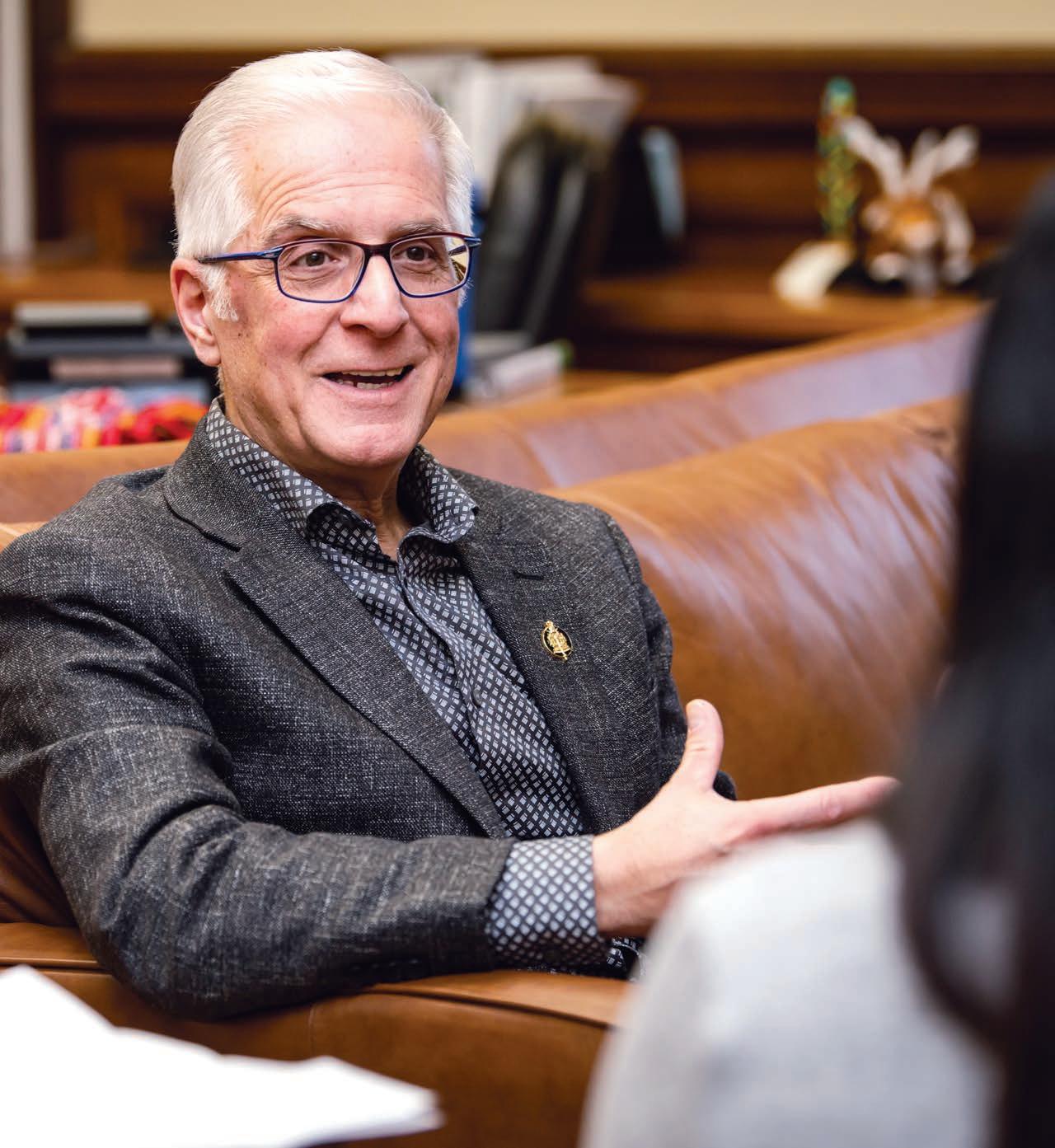
WINTER 2024 | THE MB TEACHER 23
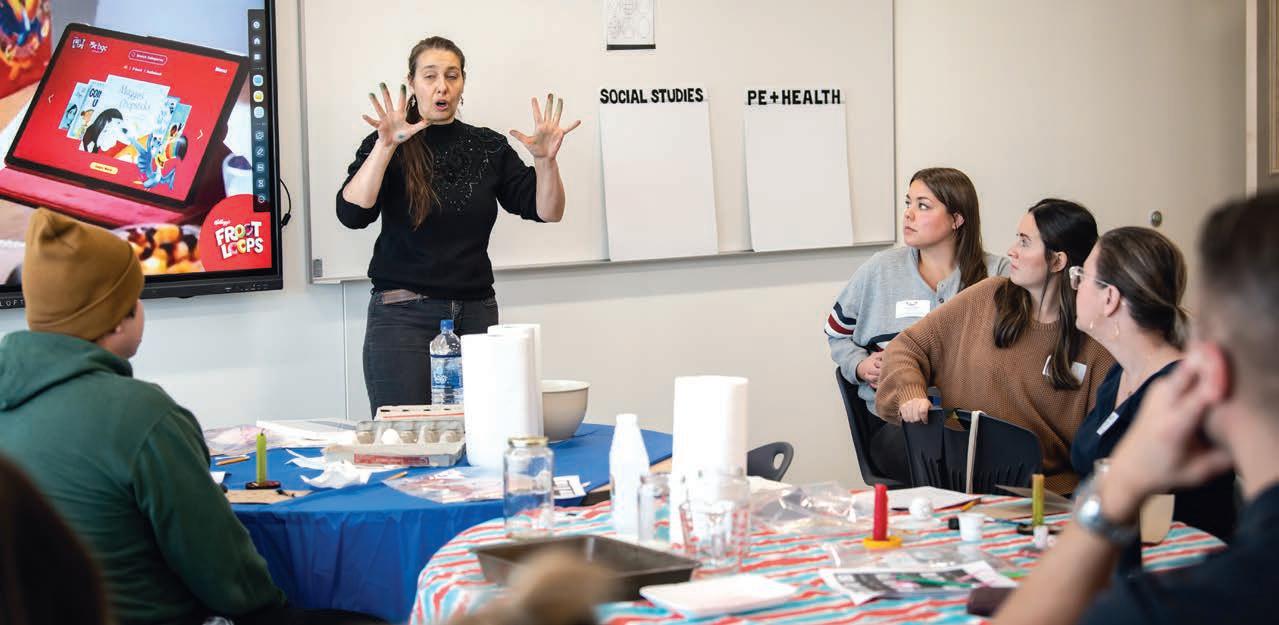
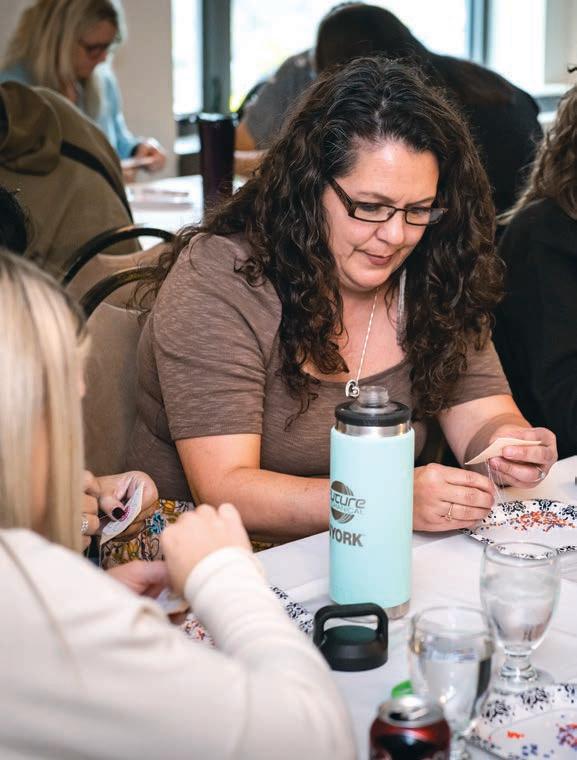

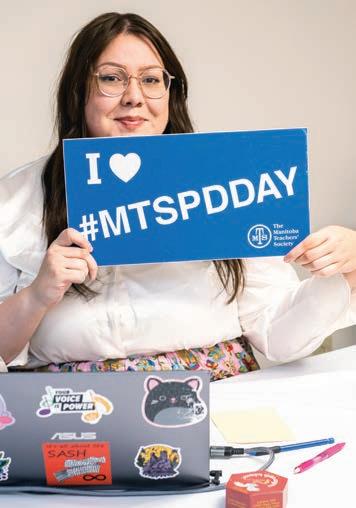

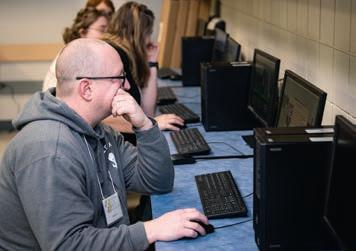
24 THE MB TEACHER | WINTER 2024
MTS PD DAY RECAP
MTS Professional Development Day continues to support teachers in their autonomous professional development.
Once again, the MTS Professional Development Day featured over 1,000 workshops hosted by 32 SAGEs including ÉFM, COSL and LIFT in Winnipeg, Brandon and numerous satellite sites around the province. Thousands of participants attended professional learning sessions on October 20th (in-person or virtually) and
shared their experiences with colleagues on social media through the #MTSPDDAY hashtag. MTS PD Day is an opportunity for teachers to select and participate in professional learning they have identified as important in their development as a professional. It’s a great day for networking and connecting with others
who are also interested in learning about new strategies, techniques, or trends in a particular area of interest.
Many heart-filled thanks to all the conference organizers and the hundreds of volunteers who contributed their time and expertise to offer high quality professional development opportunities on this day.
SPOTLIGHT ON SAGEs
Spotlight on SAGEs is a regular feature highlighting opportunities for enrichment and inspiration offered by the MTS Special Area Groups of Educators.

THE READING COUNCIL OF GREATER WINNIPEG
The Reading Council of Greater Winnipeg (RCGW) has been dedicated to promoting literacy and developing lifelong readers since 1956. This SAGE has a proud history of being a literacy leader in Manitoba through MTS, and internationally as a local council of the International Literacy Association. RCWG provides professional development for educators, shares resources and ideas on its website, celebrates I Love to Read Month, promotes literacy in the community, honours literacy leaders and up-and-coming teacher candidates, and supports literacy projects. Join RCGW today!
To learn more visit rcgw.weebly.com or scan the QR code.

THE MANITOBA ASSOCIATION FOR ART EDUCATION
The Manitoba Association for Art Education (MAAE) is a nonprofit organization of teachers and artists dedicated to promoting, advancing and improving visual art education in the province of Manitoba. The MAAE executive holds monthly meetings. We offer microgrants for MAAE members, such as the Visiting Professional Artist/Indigenous Elder/Indigenous Knowledge Keeper Microgrant, the Materials and Resources Microgrant for Innovative Art Projects, and the Winnipeg Art Gallery Tour and Workshop Grant. In addition, MAAE offers a variety of programming for MTS PD Day available to all MTS members. Join us!
To learn more visit manitobaarteducation.com or scan the QR code.
WINTER 2024 | THE MB TEACHER 25
WE ASKED TEACHERS:
WHAT WAS YOUR FAVORITE THING ABOUT MTS PD DAY THIS YEAR?



CHRIS L.
Louis Riel Teachers’ Association
We have a lot of members through TEAM (SAGE group) who are Industrial Arts educators who teach on their own. A lot of them don't have the opportunity to connect and to talk to other people in their areas. So we try to give them chances to connect in their area groups. We set up our PD day so that we have access to about eight different areas or more, and it gives them a chance to connect and explore the new technologies. One of the best things we've done is introduce students from Red River College to the profession and create connections that strengthen industrial arts throughout the province.
SHELLEY D.
Winnipeg Teachers’ Association
My favorite thing about PD Day this year is how everyone got along so well. Whether they were trying to get into a session or were in a session and they asked questions, everyone was supportive of each other. The group that I worked with was great and we helped each other out. Everyone was just wonderful and kind, and caring about how we were emotionally and how to be the best people we can be going forward.
CHRISTINA P.
River East Transcona Teachers’ Association
It's so great, especially for the Manitoba Drama Educators Association to be back together in person. We’re usually the only drama educator within a building so it's extra special for us to come together as a community because we're often feeling kind of isolated within our schools. Also, this year, what was really exciting was we got to bring in the conversation around AI and the arts and the performing arts and what that looks like. Because that’s going on right now. And how can we find ways to use these platforms and challenge some of the ideas around these platforms to help students grow, and to still show the beauty of the performing arts and drama and how you incorporate that into your classroom? There was so much excitement around being back together this year that we doubled our executive. So we're very excited to bring in a lot of fresh ideas and see where we could take our executive next year.
26 THE MB TEACHER | WINTER 2024
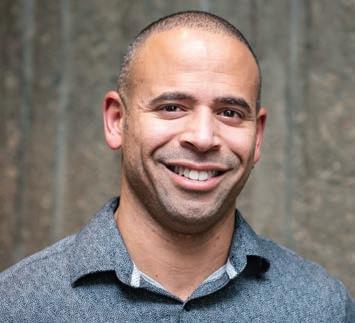
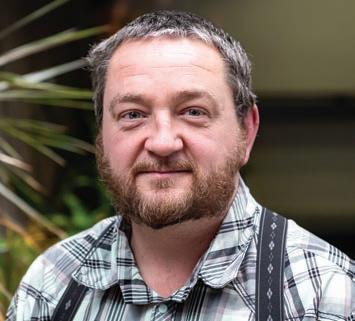
MTSPODCAST!
MANUEL C. G.
Seven Oaks Teachers’ Association
As a new teacher in the profession, it was my first face-to-face in-person ACEM PD Day with my peers in the profession of business and commerce teachers. It was a great experience. One part that I liked about our particular day was how we tackled the financial aspect of credit, specifically how poorly right now Canadians are doing when it comes to their financial discipline and responsibility. How do they keep their credit score at a decent level and how can they get access to their credit score? That was very enlightening information. And I knew the numbers were a little bit concerning - 40% of Canadians have debt in the country. So to see how that looks in a graphic is even more eye opening. I feel like we should ingrain that financial literacy into schools when we’re teaching anything finance-related.
JONATHAN W.
Hutterian Educators of Manitoba
We had our HEM session and had 50 people come out, and almost all our executive members were here. I really enjoyed the conversations we had in the time we spent together. During the year, other than our executive meetings, we don’t get to spend much time with other teachers. Especially since I come from a small school – we have seven teachers. So basically, all the interaction I get during the year is with these teachers and this PD Day. Just spending time with other teachers in person is very valuable.

LISTEN ON:




MB Teachers Unplugged episodes feature MTS members, staff, and education experts supporting Manitoba educators’ wellbeing, collective bargaining, and professional development. Subscribe on all your favourite podcast apps (Apple Podcasts, Google Podcasts, Spotify and PodBean) or listen online directly at PodBean.com.
We’d love to hear your feedback as well as ideas for future episodes and guests. Email us at MBTeachersUnplugged@mbteach.org.
MTS is recording en français as well! Subscribe to Au Cœur de l’éducation on all your favourite podcast apps or or listen online directly at PodBean.com.
WINTER 2024 | THE MB TEACHER 27
NEW!
BREAKING THE STRESS CYCLE:
A CLASSROOM ROUTINE FOR STUDENT AND TEACHER WELL-BEING
By Kailey Lefko and Josianne Barnabé, Louis Riel Teachers’ Association

When emotions are overflowing it sets off a feedback loop, with stress messages bouncing between body and mind, trapping you in a cycle of fight, flight, or freeze. If the human body is stuck in a prolonged stress cycle our mental health and well-being are at risk.
Your teaching to-do list is a mile long. Report cards, evaluations, lesson planning—your mind is a whirlwind of responsibilities. A challenging student situation adds complexity, and balancing professional and personal duties leaves you arriving at school fatigued, stressed, and possibly on the brink of burnout.
Have you ever noticed that in these moments, the challenges presented by your students’ behaviours tend to intensify? It’s not a coincidence; it’s the interconnected nature of emotions.
EMOTION IS INTERNAL COMMUNICATION
Emotions serve as internal messengers, facilitating communication between different parts of the body. When thoughts of an overflowing plate trigger stress, your body responds with tension, disrupted digestion, or a release of adrenaline and cortisol hormones. This sets off a feedback loop, with stress messages bouncing between body and mind, trapping you in a cycle of fight, flight, or freeze. The human body is designed to oscillate between stress and relaxation, but sometimes we find ourselves stuck in prolonged stress cycles. This is completely normal and can happen to anyone, but in the long term it can affect our mental health and wellbeing negatively.
Understanding this, we can focus on monitoring our thoughts and recognizing when we’re caught in the stress cycle. Shifting thoughts alone might not always suffice, especially
when deeply entrenched in stress. In such cases, breaking the cycle through action becomes essential—consider it an intervention to disrupt the loop. While a midday forest walk might not be practical on a school day, there are alternatives.
EMOTION IS INTERPERSONAL COMMUNICATION
The intricate connection between mind and body is rooted in our neurobiology. Emotion acts not only as internal communication but also as a means of understanding and connecting with others—this is interpersonal neurobiology. When teachers arrive at school harboring stress and overwhelm, students’ brains are wired to pick up on these emotions, initiating a reciprocal stress cycle in their own bodies and manifesting in behaviours like lack of focus, potential conflict, and physical discomfort.
While teachers often interpret these behaviours as challenges, considering the underlying thought-emotion-action cycle can provide a deeper understanding. The students’ dysregulation signifies an ongoing internal dialogue prompting their bodies to enter stress mode and their behaviours to reflect that stressed state. This cyclic exchange between teacher and student may hinder effective teaching and learning.
Emotions are contagious. Our neurobiology is finely tuned to efficiently decipher others’ emotions through their actions. Body language often speaks
28 THE MB TEACHER | WINTER 2024
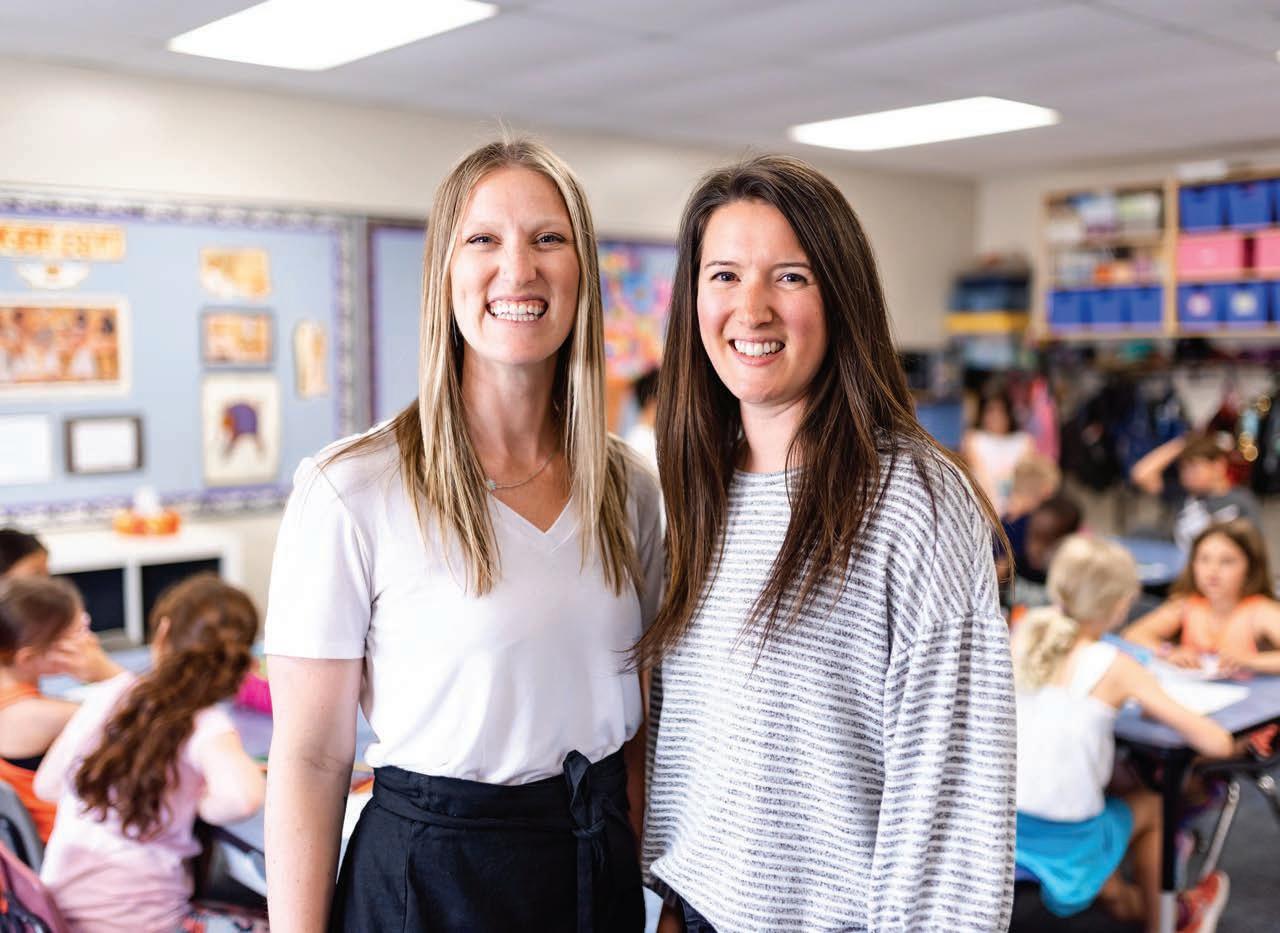
louder than words, revealing true emotional states even when verbalized as "fine." Hence, when you’re stressed or anxious, students notice and, in turn, exhibit more challenging behaviours. This cycle isn't exclusive to students; it can emanate from any encounter in your day.
Now, with 25+ students in the classroom, this cycle is much more complex than the example used above. You aren’t the only one sharing their emotional state with others and it isn’t your fault if your students are dysregulated! Still, understanding how emotion is shared in a group empowers
us to use it to our advantage and leverage interpersonal neurobiology to create a better learning environment.
HOW TO PREPARE THE BRAIN AND BODY FOR LEARNING
Recognizing that each student and teacher show up at school in a different mood, taking proactive actions that aid emotional regulation for everyone is key. Fostering co-regulation (regulating emotions together) with students becomes crucial. Extending beyond immediate needs, in the long term, co-
regulation equips students with selfregulation skills, which also leads to easier classroom management.
Effectively engaging in academics requires a regulated body and mind. Starting a lesson without readiness is a common challenge for teachers facing time constraints and pressures from packed schedules and curriculum demands. However, it’s crucial to emphasize that overlooking the vital step of co-regulation is a false economy. Unregulated emotions diminish information absorption, compromising learning quality and causing potential frustration for both teachers and
WINTER 2024 | THE MB TEACHER 29
students. Therefore, prioritizing academic content without addressing emotional and regulatory needs first makes the time spent on academics less impactful.
Prioritizing co-regulation is an essential investment, transforming the classroom into an ideal environment for meaningful learning. Efficient emotional regulation maximizes information absorption, optimizing educators’ time and enhancing the overall teaching and learning experience.
Co-regulation doesn’t have to be complicated! Let’s dive into how to easily integrate co-regulation and establish a daily mental hygiene routine in your classroom.
HOW TO PRACTICE CO-REGULATION
First, select a specific time in the school day to incorporate co-regulation into your routine. Add it to your schedule, whether at the start of the day, after lunch, or during transitions. Consistency is key; establishing a daily routine helps students anticipate and value this dedicated time for emotional wellbeing. Begin with once a day, and as the routine becomes established, consider increasing the frequency as needed.
Second, practice co-regulation with simplicity in mind. Choose easy-toimplement, ready-to-use resources, keeping activities brief—ideally under 5 minutes—to seamlessly fit into the school day. Success hinges on routine and repetition. Commit to practicing a selected co-regulation strategy for one week to one month, before moving on
to the next, allowing students to solidify the strategy in their regulation toolboxes for lasting benefits. Remember, active teacher participation is essential in coregulation exercises.
Now, let’s explore three effective co-regulation strategies to integrate into your daily routine with your K-12 students:
• 5-Finger Breathing : Trace the outline of your hand with the opposite pointer finger, synchronizing the movement with deep, intentional breaths. This method encourages mindfulness and can be discreetly practiced at the desk.
●• Balloon-Belly Breathing : Guide your students to place their hands on their bellies and to take deep breaths, imagining their belly as a balloon inflating on the inhale and deflating on the exhale. Balloonbelly breathing promotes relaxation and a sense of calm.
●• Educalme Audio : Leverage the resources provided by Educalme. Utilize the guided audio sessions, designed specifically for coregulation. These allow both students and teachers to engage in calming exercises together.
Experiment with co-regulation strategies to discover what resonates best with your students. Recognize that not all students may participate in every exercise, and that’s okay. Even if they choose not to join in, they will still benefit from the calming shift of the group’s energy.
BREAK THE STRESS CYCLE
Educalme, developed by Manitoba teachers, is an evidence-based mental health and social-emotional learning program for K-12 classrooms. No preparations or professional development are needed; we provide time-efficient tools that seamlessly integrate into daily classroom routines. Beyond fostering co-regulation, Educalme improves classroom management, preserving valuable instruction time. Available in English and French, Educalme is well-suited for the diverse Manitoban educational landscape.
According to Annette, a Grade 5 teacher, “Words cannot express how grateful I am to have discovered Educalme. So many students have experienced traumas that nobody should ever endure. Then, the pandemic. So, self-regulation is a must, and this has helped our class so much.” Annette’s experience reflects that of many educators who consider Educalme a vital resource.
Educalme empowers teachers to foster classrooms where emotional well-being and academic success mutually reinforce each other. This enhances overall mental health, focus, and resilience for both teachers and students, positioning Educalme as a cornerstone in creating thriving learning environments.
For inquiries, please contact us at bonjour@educalme.com
EXPLORE EDUCALME’S FREE RESOURCE LIBRARY
HERITAGE FAIRS PROGRAM
IMPROVE BOTH STUDENT AND TEACHER WELLBEING
To learn more visit https://www. canadashistory.ca/education/heritagefairs-and-young-citizens and https://www.redriverheritage.ca/ or scan the QR codes.
Educalme is a proactive and systematic approach for preventing overwhelm and burnout, while preparing minds and bodies for effective teaching and learning every single day of the school year. Explore Educalme’s free resource library, available in both English https:// www.educalme.com/welcome/ and in French https://www.educalme.com/bienvenue/ or scan the QR codes.
30 THE MB TEACHER | WINTER 2024
ENG FRE


























•Relationships
•Family
































& Family Assistance Program (MFAP) We can help. Free and confidential support for eligible members and their families.
Member
and Couples
and Parenting
Depression
Use
and Financial
and Bereavement
Coaching
Management
and Nutrition
Stress
and Harassment
and Trauma HumanaCare’s supports and services can assist in the following areas: 1-800-661-8193 24 HOURS A DAY ANYWHERE IN NORTH AMERICA www.humanacare.com/mts
•Stress •Anxiety •
•Substance
•Legal
•Grief
•Career
•Behavioural
•Diet
•Work-Related
•Bullying
•Crisis
THE PRINCIPAL OF THE THING: TENDING OUR ROOTS, TELLING OUR STORIES
By Bonnie Rempel, Principal, R.D. Parker Collegiate
Our youth are not broken; they need our help to better understand themselves and their purpose. Children need the opportunity to unpack the trauma that their young hearts have been exposed to, before we can expect them to be successful academically.
I have lived in Northern Manitoba for the last 50 years, raising three amazing children with my husband Barry, and spending the last 32 years serving and supporting our community, our families, and the children that live here in Thompson. I began my educational journey as a student in the same school in which I began my teaching career, at Burntwood Elementary School. I grew up and lived in the community, and graduated from R. D. Parker Collegiate in 1987, where I am now the principal. This place has been my home for nearly my entire life, and I wish nothing but the best for the people and land in Northern Manitoba. Those who come north, whether they come to live here or visit, take a piece of it with them wherever they go.
I share this history with you because my roots are important. So are the roots of our students, many of whom are Indigenous. When we know our roots, when they’re strong, understood and valued, so much becomes possible.
My time with the School District of Mystery Lake in Thompson has been unbelievably rewarding and, at times, unbelievably heartbreaking. Many of our youth are struggling
with poverty, addictions, trauma and systemic discrimination. Indigenous culture is one of beauty and tradition that all students would benefit from learning and understanding. Often our youth are uncomfortable, unaware and afraid to celebrate their heritage. Our children need us more than ever, and we must be willing to work together to provide the resources and support that they need, without making excuses or attaching blame.
Our youth are not broken; they need our help to better understand themselves and their purpose. Children need the opportunity to unpack the trauma that their young hearts have been exposed to, before we can expect them to be successful academically.
BUILDING A SPACE
With all of this in mind, our conventional education system continues to offer the same programming while expecting different results year after year. A change of mindset and focus is key to how teachers can be a part of the solution. It is my dream to build a traditional, outdoor, Indigenous space on R. D. Parker Collegiate’s school grounds in the hope that it will service not only our youth, but our entire

community. The space would include a sweat lodge, fire pits, and an area for smudging, all while being overseen by an Elder.
I am surrounded by people who share the same dream for our students. Creating this space is only the beginning, as we need community support and commitment to turn it into the culture-rich learning environment we envision. Collectively, our families and community members hold many cherished teachings and knowledge. We need to provide a space for this knowledge to be shared and celebrated, and for our high school students to become the teachers themselves for younger children. With these relationships, younger students will come into high school with pride and confidence in themselves, their culture and community.
ELDER GUIDANCE
We are honoured to welcome Elder David Sanderson to the R. D. Parker family, and he is committed to joining us on this journey. After spending many years working with youth in the North, David understands the need for us all to work together, grow together, and support one another. With an area for
32 THE MB TEACHER | WINTER 2024
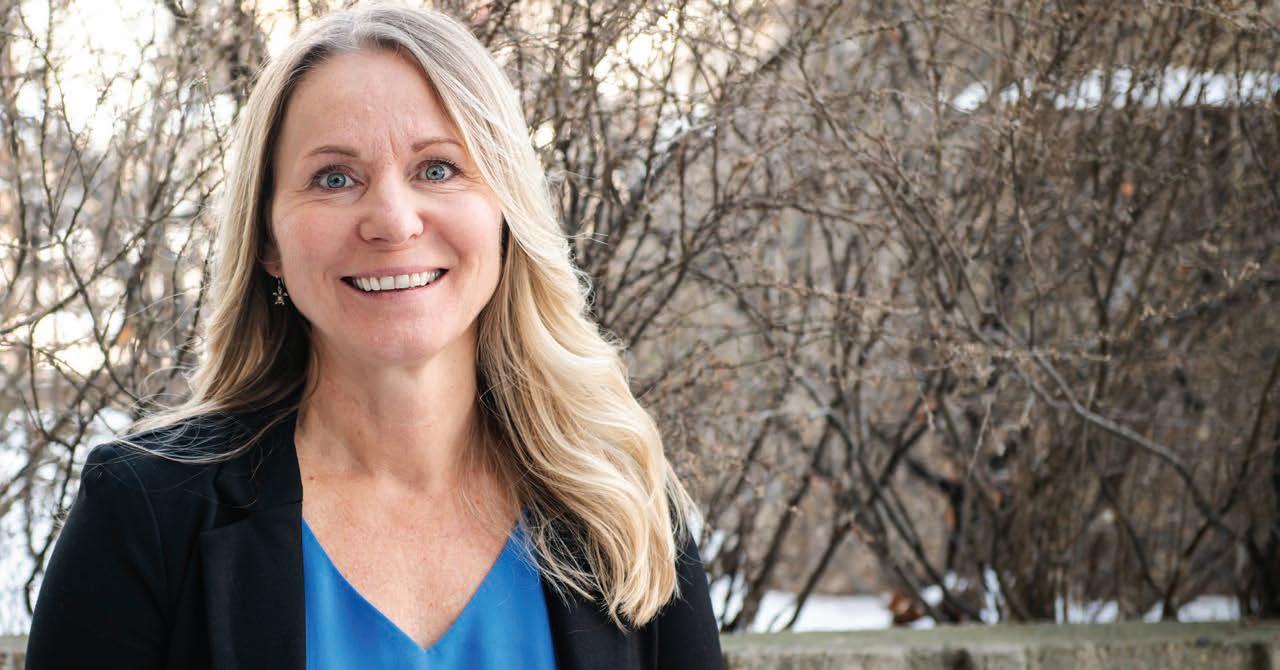
smudging on campus, students would be able to take a moment to ground themselves and bring clarity to the mind before they start each day. This helps us to infuse Indigenous education into everyday life here at R. D. Parker, making it part of who we are instead of a list which needs to be checked off.
We need to embrace Two-Eyed seeing; observing the strengths of Indigenous ways through one lens and the strengths of Western ways through the other and together we can create a climate of understanding, knowledge and growth.
Along with our traditional space, we are looking to reintroduce an off-campus/ alternative high school option for students who require full wrap-around support and coordinated care that responds to the individual needs of each student. We need to address the barriers that our students are experiencing and provide opportunities for support through various services.
ESSENTIAL SUPPORT
In order to have a fully functional support model for students, the following must be included and implemented into this plan:
• Family involvement: Family and youth must be the center of this program as their ideas and perspectives about what is needed will support putting a plan into action.
• Team-based: The team must include individuals who are important and supportive to the family.
• Natural supports: Individuals who are positively connected to the family must be involved, to bring value to the wraparound support.
• Collaboration: It’s essential to work together, sharing responsibility for developing, implementing, monitoring and evaluating each individual plan.
• Community-based: Opportunities must be provided to participate fully in family and community life. Strategies and supports must be accessible to the family and located within our community. Our traditional space will be a great area for families during this journey.
• Culturally experienced: We must respect and value beliefs, culture and identity.
• Individualized: Each plan must be
specific to the needs of each student.
• Strength-based: This process will identify, build on and enhance the capabilities, knowledge and skills of each student.
• Truth and Reconciliation: We have a responsibility to understand the history that we have all inherited, and embed it within the culture of our off-campus program.
This 2023/24 school year will be my final year as principal of R. D. Parker Collegiate, as I will retire in June, 2024. This decision is bittersweet, as I have poured my heart and soul into my community for the last 32+ years, and will dearly miss my family, friends, and school community. I have faith and hope in the local community of Thompson to continue to work towards supporting our youth, as they all deserve to feel success. They are smart, artistic, and gifted, and need to be reminded of how special and supported they are.
Every child has a story to tell, and they need someone to tell it to. We must be willing to listen, not when we are ready to hear it, but when they are ready to share it.
WINTER 2024 | THE MB TEACHER 33
BOOK REVIEWS
By Donna Hardman, JB Mitchell School, Winnipeg School Division
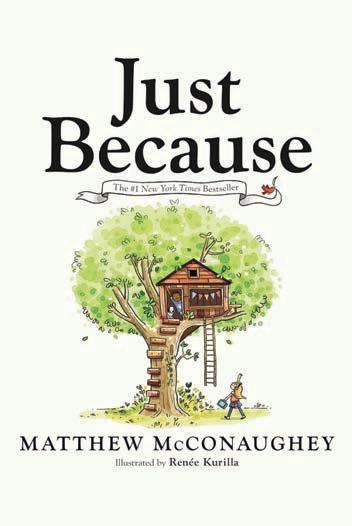
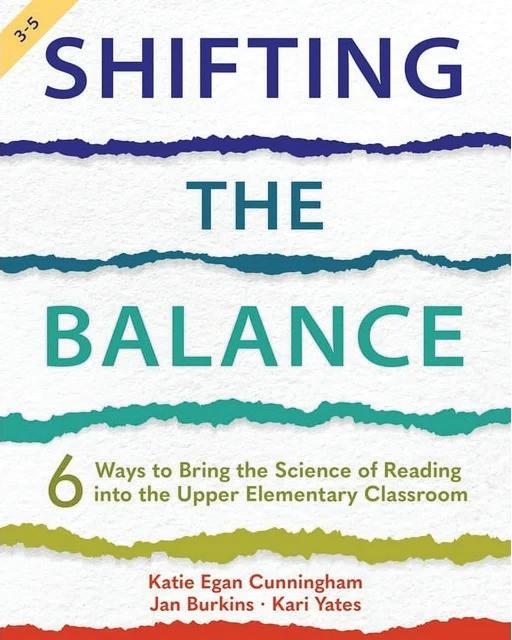
JUST BECAUSE
Author: Matthew McConaughey
Publisher: Viking Books for Young Readers (2023)
Today’s world is a complex place and with social media at the forefront of our social interactions, it’s easy to get caught up in one side of how a story or issue is presented. Matthew McConaughey’s new book Just Because turns the spotlight on the power of contradictions and reminds us that what we see or perceive is only one side of any story.
This heartwarming children’s book walks the reader through a variety of interactions. From handling bullying to acknowledging that luck sometimes goes along with skill to turning around difficult points in a friendship, McConaughey reminds us that while contradictions are all around us, they don’t define us. Ideal
SHIFTING THE BALANCE
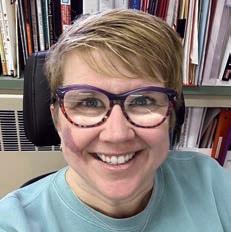
for both adults and children alike, the book is utterly heart-warming, with illustrator Renee Kurilla capturing the essence of feelings within her characters. And the text, presented in a short and simple “if/ then” style, resonates very well.
All of us experience these same feelings and contradictions throughout our lives. Just Because would be great for teachers to use in exploring writing traits such as idea development and word choice, but it would also make a wonderful gift for a special person in anyone’s life. Remember: just because it’s a great teaching book, doesn’t mean it can’t also touch someone’s heart.
Authors: Katie Egan Cunningham, Jan Burkins and Kari Yates
Publisher: Routledge (2021)
When the “reading wars” debate first exploded just prior to the start of the pandemic, authors Jan Burkins and Kari Yates responded with their 2021 book Shifting the Balance, targeting reading instruction in K-2 classrooms. After several years, the authors, plus additional collaborator Katie Egan Cunningham, are back with Shifting the Balance (Grades 3-5). This new book specifically addresses how the science of reading fits into upperelementary level classrooms.
Written in the same easy-to-follow format of their first page-turner, the authors present six timely and manageable shifts teachers can make in their current teaching practices to yield high-impact
results for students. From thinking about the role of strategy instruction to deepening vocabulary instruction to developing independent practice, the authors present a pathway to adjustments that give the power of learning back to our kids. Each chapter highlights important research, names misunderstandings that many teachers may hold and outlines practical, simple ways to move towards change in practice.
The journey doesn’t feel daunting or unachievable, which is crucial when the teaching practice often feels overwhelming and heavy. With its easily readable format and practical ideas, this book should be on the bookshelf of any upper-elementary teacher.
34 THE MB TEACHER | WINTER 2024

January 8 - February 23, 2024

Habitat Canada’s national writing contest is a unique and meaningful way to get children involved in creative writing and giving back in their community.
Children in grades 4, 5, and 6 are invited to write an entry between 50 and 300 words about what home means to them in English or French. Each entry results in a $10 donation to Habitat Manitoba.
Grand prize winners receive a $30,000 grant for their local Habitat and runner-up winners receive $10,000 for their local Habitat, plus all winners recieve a tablet for themselves and a pizza party for their class!
Visit meaningofhome.ca to get your classroom started!
For questions please contact:
Vernelle Mirosh
Director, Fund Development
vmirosh@habitat.mb.ca
habitat.mb.ca




HELPING DELIVER ENERGY EFFICIENCY EDUCATION TO YOUR CLASSROOM Generation E teaches young people how saving energy can benefit not only individual households but our planet as a whole. We offer free activities, lesson plans, and other resources in both English and French to help you educate your students about the many benefits of energy efficiency. Visit generation-e.ca to download our free energy efficiency resources, or contact us to book a free presentation! All rights reserved. Generation E is a program of LESSON PLANS TEACHER NOTES PRESENTATIONS ACTIVITIES CONTACT US instagram @generation_e_mb facebook @generationemb youtube generation e email hello@generation-e.ca website generation-e.ca





























































































































